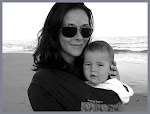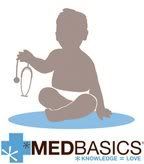 I walked into babysitting yesterday and the Hermanns had put up a beautiful Christmas tree, complete with glass bulbs and delicate ornaments. Lights were twinkling and candles were burning and it was beautiful. And my first thought was, "Great. Just great. There'll be no taking my eyes off Vivi now!"
I walked into babysitting yesterday and the Hermanns had put up a beautiful Christmas tree, complete with glass bulbs and delicate ornaments. Lights were twinkling and candles were burning and it was beautiful. And my first thought was, "Great. Just great. There'll be no taking my eyes off Vivi now!"
Vivi is the youngest Hermann kid, who at 11 months is a little speed demon on all fours. Like every baby, she's curious about everything and most of it ends up in her mouth. So while the holidays are magical and absolutely my favorite time of year, they do bring along some extra safety challenges to take into consideration. Here are a few tips...
- Make sure Christmas trees are in a secure stand and will hold up to a baby's tug on a lower branch. Keep the glass and other breakable ornaments up high out of baby's reach, and if you're going to hang soft ornaments on the bottom, try and do so with string, not metal hooks. Clean up fallen needles often.
All those lights mean extra wires! Inspect to make sure nothing is frayed, tape up the wire along walls so baby can't wrap it around herself, and make sure unoccupied outlets are covered.
Some of the beloved holiday plants are actually poisonous to people (and pets, so keep your eye on Fido too). Mistletoe, Jerusalem Cherry, holly berries, and amaryllis, while really pretty to look at, can have all sorts of unpleasant effects if ingested, and in some cases may cause death. The ubiquitous poinsettia, while not toxic, may cause a rash if the sap contacts the skin, and eating a few leaves could leave baby feeling sick.
Remember, houseguests and visitors may inadvertently bring potential dangers along with them. Suitcases left on the ground may contain medicines and small objects baby can ingest, so make sure everyone in the house knows to keep these things out of baby's reach.
So the holiday season doesn't have to mean stress and panic for your sitter or yourself. With a little extra awareness and vigilance, you can have your fruitcake and eat it too!
Happy Holidays!
-Zoey, sitter to the Hermann kids



















